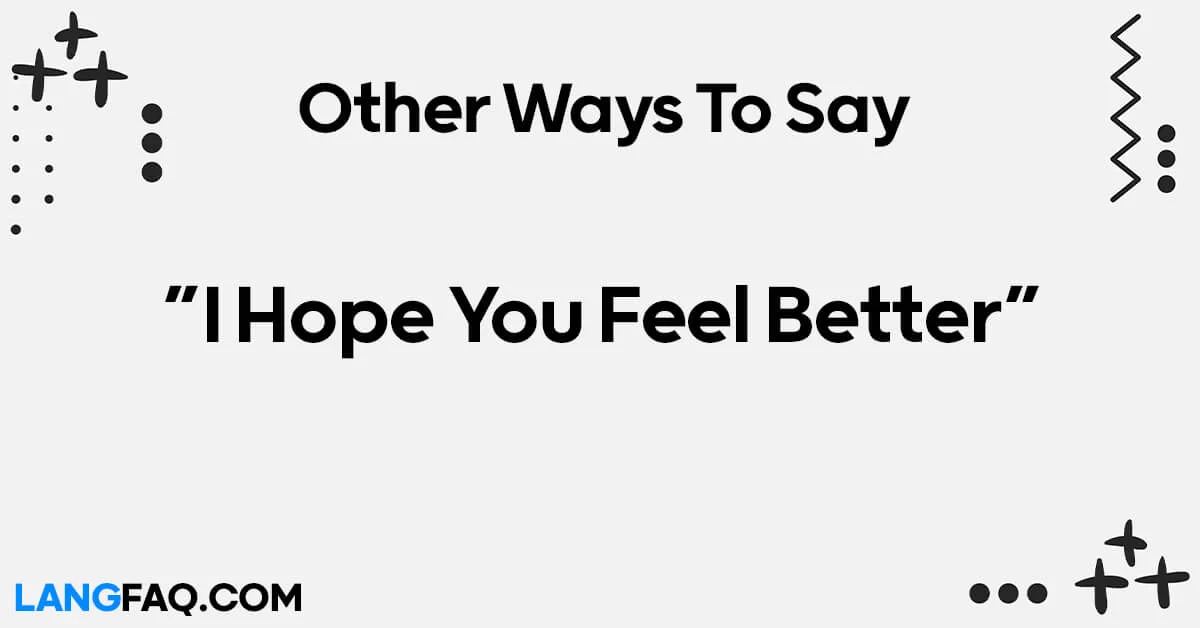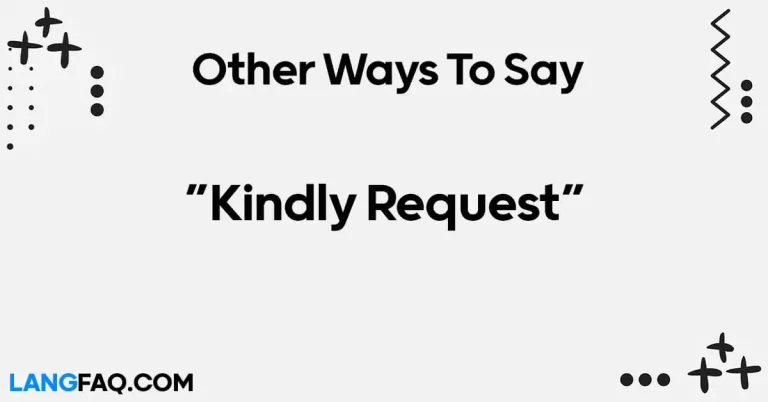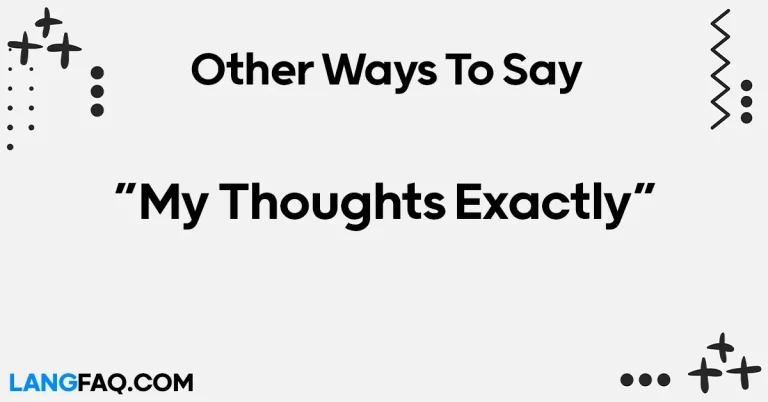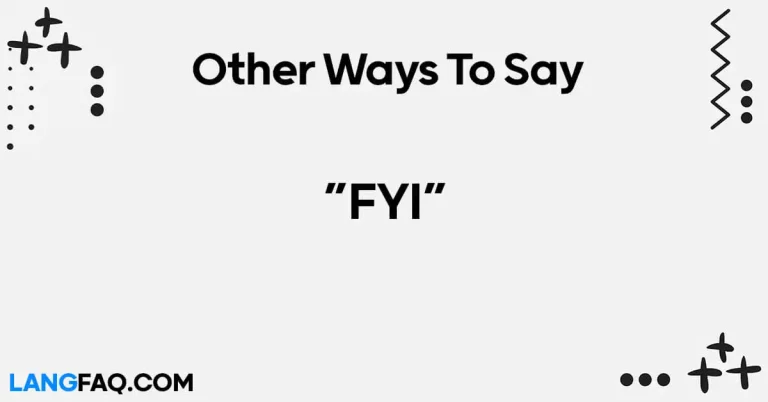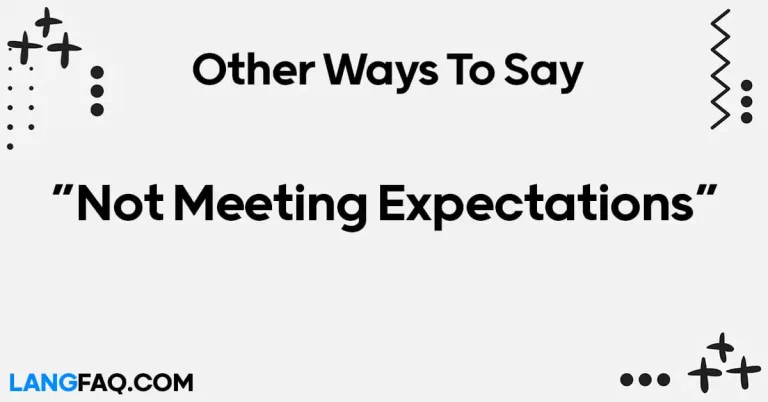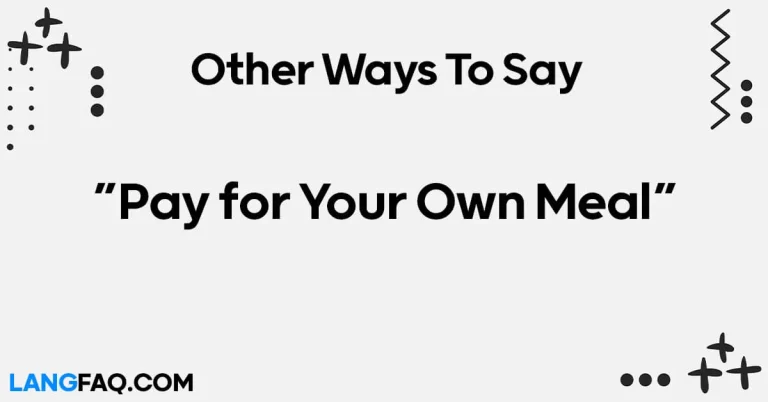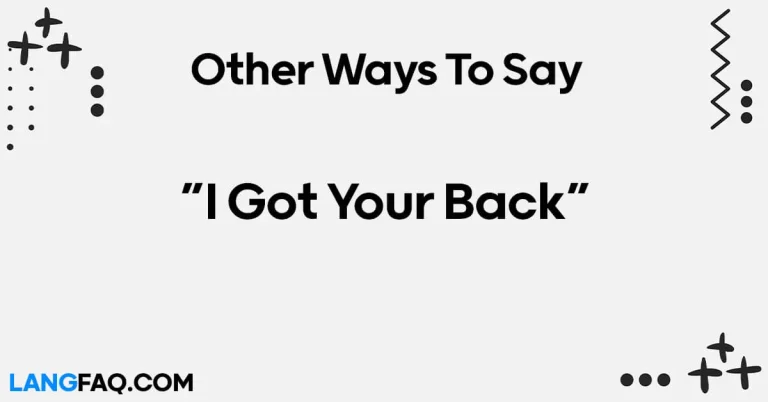Sending wishes for a swift recovery is a common gesture, but why limit yourself to the standard phrase? In this comprehensive guide, we’ll delve into 12 unique and heartwarming ways to express your concern for someone’s well-being. Discover diverse alternatives that go beyond the traditional “I Hope You Feel Better” and add a personal touch to your messages.
12 Other Ways to Say “I Hope You Feel Better”
Here are 12 other ways to express “I hope you feel better”:
- Get well soon!
- Wishing you a speedy recovery.
- May you bounce back quickly!
- Sending healing vibes your way.
- Hoping for your swift return to good health.
- Take care and feel better soon.
- May your health be restored in no time.
- Here’s to a speedy recovery!
- Wishing you strength and wellness.
- Get back on your feet soon!
- Hoping you’re back to your vibrant self soon.
- Recover swiftly and take it easy!
Here’s a table with meanings and examples for the 12 ways to express “I Hope You Feel Better”:
| Expression | Meaning | Example |
|---|---|---|
| Get well soon! | Wishing a speedy recovery | “Get well soon! We miss your cheerful presence.” |
| Wishing you a speedy recovery. | Hoping for a quick return to good health | “Wishing you a speedy recovery and brighter days ahead.” |
| May you bounce back quickly! | Expressing hope for a swift recovery | “May you bounce back quickly from this minor setback.” |
| Sending healing vibes your way. | Conveying positive energy for healing | “Sending healing vibes your way for a quick recovery.” |
| Hoping for your swift return to good health. | Wishing for a fast recovery | “Hoping for your swift return to good health. Take care!” |
| Take care and feel better soon. | Expressing care and well-wishes | “Take care and feel better soon. We’re here for you.” |
| May your health be restored in no time. | Wishing for a rapid restoration of health | “May your health be restored in no time. Get well soon!” |
| Here’s to a speedy recovery! | Toasting to a quick and successful recovery | “Here’s to a speedy recovery! Can’t wait to see you well.” |
| Wishing you strength and wellness. | Hoping for both physical and mental well-being | “Wishing you strength and wellness during your recovery.” |
| Get back on your feet soon! | Encouraging a quick return to normal activities | “Get back on your feet soon, and let’s catch up.” |
| Hoping you’re back to your vibrant self soon. | Wishing for a return to one’s lively state | “Hoping you’re back to your vibrant self soon. We miss your energy.” |
| Recover swiftly and take it easy! | Advising a quick recovery with caution | “Recover swiftly and take it easy – we’ll handle the rest.” |
Expressing well-wishes for someone’s recovery can be done in various heartfelt ways. Whether through traditional phrases or creative expressions, the intention is to convey warmth, support, and a sincere desire for the person to feel better soon. Choose the expression that resonates most with your sentiments and the recipient’s personality for a personalized and caring message.
Is It Correct to Say “I Hope You Feel Better”?
Absolutely! “I hope you feel better” is a perfectly correct and commonly used expression when wishing someone a swift recovery or improved well-being. This phrase is a genuine and empathetic way to convey your concern for someone who may be going through a tough time, whether due to illness, stress, or any other challenging situation.
When to Use:
- Illness: This expression is often used when someone is unwell, either physically or emotionally. It expresses a wish for their health or overall mood to improve.
- Stress or Hard Times: If someone is going through a difficult period, saying “I hope you feel better” can also extend to emotional well-being, offering comfort and support during stressful times.
Example Usage:
- “I heard you’ve been feeling under the weather. I hope you feel better soon!”
- *”I know things have been tough lately. Take care, and I hope you feel better.”
Variations:
- “I hope you get well soon.”
- “Wishing you a speedy recovery.”
- “May you bounce back quickly!”
Insight: This expression is straightforward, sincere, and widely accepted in both formal and informal contexts. It’s a versatile way to convey well-wishes for various situations and relationships, showcasing your empathy and care for the other person.
Professional Mail Example With “I Hope You Feel Better”
Subject: Wishing You a Swift Recovery
Dear [Recipient’s Name],
I hope this email finds you well, albeit considering the recent news about your health. I wanted to take a moment to extend my sincerest wishes for a swift recovery.
I understand that these times can be challenging, both physically and emotionally. Your well-being is of utmost importance to us, and we want to assure you that the entire team is behind you, supporting you through this.
If there’s anything specific you need assistance with or if you require any accommodations during your recovery, please don’t hesitate to reach out. We are more than willing to make adjustments to ensure your comfort and well-being.
Take the time you need to rest and recover fully. Your health is the top priority, and we eagerly anticipate your return to full strength. In the meantime, feel free to let us know if there’s anything we can do to make this period more manageable for you.
Wishing you a speedy recovery and looking forward to your healthy return.
Best regards,
[Your Full Name] [Your Position] [Company Name] [Contact Information]
Wishing You a Swift Recovery: Get Well Soon!
Expressing your heartfelt desire for someone’s speedy recovery is a classic way to show care and support. In both formal and informal contexts, this phrase is a universal expression of good wishes, suitable for colleagues, friends, or family.
Example Scenario: Imagine your colleague has been under the weather, and you want to send them a thoughtful email:
*”Subject: Get Well Soon!
Hi [Colleague’s Name],
I heard you’ve been feeling a bit under the weather. Just wanted to drop a quick note to wish you a speedy recovery! Take all the time you need to rest and get back to your vibrant self. We miss having you around the office.
Best wishes, [Your Name]”*
Variations:
- Professional Variation: “Wishing You a Swift Recovery: Get Well Soon, [Colleague’s Name]!”
- Casual Variation: “Hey [Friend’s Name], Get Well Soon!”
Insight: The phrase “Get Well Soon” is a timeless and widely accepted way to convey your well-wishes. It’s suitable for various relationships and can be adapted to formal or informal settings.
Hoping for Your Swift Return to Good Health: A Formal Touch
When you want to add a touch of formality to your well-wishes, expressing hope for a swift return to good health is a sophisticated choice. This phrase works well in professional settings, conveying concern and professionalism simultaneously.
Example Scenario: Imagine you want to send a formal email to a business associate:
*”Subject: Wishing You a Swift Recovery
Dear [Associate’s Name],
I learned about your recent health challenges, and I sincerely hope for your swift return to good health. Your well-being is of utmost importance, and we look forward to your healthy return to work.
Best regards, [Your Full Name] [Your Position]”*
Variations:
- Business Variation: “Hoping for Your Swift Return to Good Health, [Associate’s Name]”
- Professional Email: “Dear [Colleague’s Name], Wishing You a Swift Recovery”
Insight: Adding a formal touch to your well-wishes is appropriate in professional contexts, demonstrating your professionalism and empathy.
May You Bounce Back Quickly!: Adding Optimism to Your Wishes
This phrase injects optimism and positivity into your well-wishes, making it suitable for friends, family, and colleagues alike. It’s a versatile expression that communicates hope and resilience.
Example Scenario: Imagine your close friend is going through a tough time, and you want to uplift their spirits:
*”Hey [Friend’s Name],
I know things have been challenging, but I believe in your strength. May you bounce back quickly and emerge even stronger! If you need anything, I’m here for you.
Take care, [Your Name]”*
Variations:
- Positive Variation: “May You Bounce Back Quickly, [Friend’s Name]!”
- Encouraging Tone: “Hey [Colleague’s Name], Bounce Back Quickly!”
Insight: This phrase adds an element of resilience and encourages the person to overcome challenges swiftly. It’s suitable for various relationships and situations.
Sending Healing Vibes Your Way: Conveying Warmth and Comfort
When you want to express empathy and send a comforting message, “Sending Healing Vibes Your Way” is a warm and caring choice. It works well in both personal and professional relationships, offering solace during difficult times.
Example Scenario: Imagine your family member is unwell, and you want to send them a heartfelt message:
*”Dear [Family Member’s Name],
I heard you haven’t been feeling well, and I just wanted to let you know that I’m sending healing vibes your way. Take your time to rest, and I hope you feel the warmth of my thoughts with you.
Love, [Your Name]”*
Variations:
- Heartfelt Variation: “Sending Healing Vibes Your Way, [Family Member’s Name]!”
- Professional Comfort: “Dear [Colleague’s Name], Sending Healing Vibes”
Insight: This expression combines warmth and comfort, making it suitable for various relationships. It’s a genuine way to convey your support during challenging times.
Hoping for Your Swift Return to Good Health: A Formal Touch
When you want to add a touch of formality to your well-wishes, expressing hope for a swift return to good health is a sophisticated choice. This phrase works well in professional settings, conveying concern and professionalism simultaneously.
Example Scenario: Imagine you want to send a formal email to a business associate:
*”Subject: Wishing You a Swift Recovery
Dear [Associate’s Name],
I learned about your recent health challenges, and I sincerely hope for your swift return to good health. Your well-being is of utmost importance, and we look forward to your healthy return to work.
Best regards, [Your Full Name] [Your Position]”*
Variations:
- Business Variation: “Hoping for Your Swift Return to Good Health, [Associate’s Name]”
- Professional Email: “Dear [Colleague’s Name], Wishing You a Swift Recovery”
Insight: Adding a formal touch to your well-wishes is appropriate in professional contexts, demonstrating your professionalism and empathy.
Take Care and Feel Better Soon: A Classic Gesture of Concern
Combining care and well-wishes, “Take Care and Feel Better Soon” is a classic expression suitable for friends, family, or colleagues. It conveys genuine concern while encouraging the person to prioritize self-care.
Example Scenario: Imagine your friend is going through a tough time, and you want to express your care:
*”Hi [Friend’s Name],
I heard about what you’re going through. Please take care and feel better soon. If there’s anything I can do to support you, just let me know.
Warm regards, [Your Name]”*
Variations:
- Friendly Variation: “Take Care and Feel Better Soon, [Friend’s Name]!”
- Colleague’s Well-Wishes: “Hi [Colleague’s Name], Take Care and Feel Better”
Insight: This phrase combines a classic expression of care with an encouragement for the person to prioritize their well-being. It’s versatile and suitable for various relationships.
May Your Health Be Restored in No Time: A Wish for Swift Recovery
Expressing a wish for the rapid restoration of health, “May Your Health Be Restored in No Time” is a formal and sincere choice. It’s suitable for colleagues, business associates, or anyone you want to convey a formal yet caring message.
Example Scenario: Imagine you want to send a formal email to a colleague who is unwell:
*”Subject: Wishing You a Speedy Recovery
Dear [Colleague’s Name],
I recently learned about your health situation, and I sincerely hope that your health is restored in no time. Take the time you need to recover fully, and we look forward to your healthy return.
Best wishes, [Your Full Name] [Your Position]”*
Variations:
- Business Formality: “May Your Health Be Restored in No Time, [Colleague’s Name]”
- Professional Email: “Dear [Associate’s Name], Wishing You a Speedy Recovery”
Insight: This expression combines formality with a sincere wish for a speedy recovery, making it appropriate for professional contexts.
Here’s to a Speedy Recovery!: Toasting to Good Health
Adding a touch of celebration to your well-wishes, “Here’s to a Speedy Recovery!” is an enthusiastic and positive expression. It’s suitable for friends, family, and colleagues, creating a sense of encouragement and optimism.
Example Scenario: Imagine you want to send a cheerful message to a friend recovering from an illness:
*”Hey [Friend’s Name],
Here’s to a speedy recovery! Your resilience is inspiring, and I know you’ll be back on your feet in no time. Take care and know that we’re all rooting for you!
Cheers, [Your Name]”*
Variations:
- Cheerful Toast: “Here’s to a Speedy Recovery, [Friend’s Name]!”
- Colleague’s Encouragement: “Hey [Colleague’s Name], Here’s to a Quick Recovery!”
Insight: This phrase adds a celebratory element to your well-wishes, making it a positive and encouraging expression suitable for various relationships.
Wishing You Strength and Wellness: A Comprehensive Well-Wish
Combining the wish for strength and overall wellness, “Wishing You Strength and Wellness” is a versatile phrase suitable for various relationships. It conveys a holistic approach to well-being and recovery.
Example Scenario: Imagine you want to send a thoughtful message to a family member facing health challenges:
*”Dear [Family Member’s Name],
During this challenging time, I want you to know that I’m wishing you strength and wellness. May each day bring you closer to renewed health and vitality. Take care of yourself.
Warm regards, [Your Name]”*
Variations:
- Heartfelt Variation: “Wishing You Strength and Wellness, [Family Member’s Name]!”
- Professional Tone: “Dear [Colleague’s Name], Wishing You Strength and Wellness”
Insight: This expression takes a comprehensive approach to well-wishing, encompassing both physical and mental aspects of health. It’s suitable for various relationships and situations.
Get Back on Your Feet Soon!: Encouraging a Return to Normalcy
When you want to encourage someone to resume their normal activities swiftly, “Get Back on Your Feet Soon!” is a motivating choice. It’s suitable for friends, family, and colleagues, expressing optimism for a quick return to regular routines.
Example Scenario: Imagine your friend has been unwell, and you want to send them a motivational message:
*”Hey [Friend’s Name],
I know you’re going through a tough time, but I have full faith that you’ll get back on your feet soon! Your resilience is commendable, and I’m here to support you every step of the way.
Take care, [Your Name]”*
Variations:
- Motivational Tone: “Get Back on Your Feet Soon, [Friend’s Name]!”
- Colleague’s Support: “Hey [Colleague’s Name], Get Back on Your Feet!”
Insight: This phrase combines motivation with well-wishing, encouraging the person to resume their normal activities swiftly. It’s suitable for various relationships and situations.
Hoping You’re Back to Your Vibrant Self Soon: Acknowledging Resilience
Expressing hope for someone to return to their vibrant self acknowledges their resilience and positive spirit. This phrase is suitable for friends, family, and colleagues, appreciating the person’s energy and enthusiasm.
Example Scenario: Imagine your colleague has been going through a challenging time, and you want to send them an uplifting message:
*”Hi [Colleague’s Name],
I’ve noticed things have been tough for you lately, but I have no doubt that you’ll overcome it and be back to your vibrant self soon! If you need anything, I’m here for you.
Best, [Your Name]”*
Variations:
- Positive Variation: “Hoping You’re Back to Your Vibrant Self Soon, [Colleague’s Name]!”
- Friendly Tone: “Hi [Friend’s Name], Hoping You’re Back to Your Vibrant Self!”
Insight: This phrase appreciates the person’s positive energy and encourages them to return to their vibrant self, making it suitable for various relationships and situations.
Recover Swiftly and Take It Easy!: Balancing Urgency with Caution
When you want to express urgency for recovery while advising caution, “Recover Swiftly and Take It Easy!” strikes a balance between encouragement and care. It’s suitable for friends, family, and colleagues, showing concern for the person’s well-being.
Example Scenario: Imagine your friend has been pushing themselves too hard, and you want to send them a caring message:
*”Hey [Friend’s Name],
I know you want to get back to normal quickly, but it’s important to recover swiftly and take it easy. Your health is the top priority, so make sure to give yourself the time you need.
Take care, [Your Name]”*
Variations:
- Balanced Variation: “Recover Swiftly and Take It Easy, [Friend’s Name]!”
- Colleague’s Concern: “Hey [Colleague’s Name], Recover Swiftly and Take It Easy!”
Insight: This phrase encourages a swift recovery while emphasizing the importance of taking it easy. It’s a balanced expression suitable for various relationships and situations.
Frequently Asked Questions
What are some casual ways to wish someone a speedy recovery?
- “Hey there! Take it easy and get back on your feet soon – we miss your energy!”
- “Sending virtual hugs and good vibes your way. Get well soon, friend!”
How can I incorporate cultural expressions into my well-wishes?
Explore different cultures’ expressions for well-being. For example, in Japan, you can use “Genki,” encompassing health, energy, and a positive spirit.
Are there any humorous ways to wish someone well?
Certainly! Injecting humor can lighten the mood. Consider sending a joke prescription: laughter, three times a day!
What are some sincere and heartfelt well-wishes for a quick recovery?
Express genuine care with phrases like, “Your strength inspires us all. Wishing you a swift recovery and brighter days ahead.”
How can I infuse positivity into my well-wishes?
Use uplifting statements like, “May each day bring you closer to renewed health and vitality. You’ve got this!”
Can I use a combination of different expressions in one message?
Absolutely! Mixing and matching phrases can create a personalized and heartfelt message tailored to the individual’s preferences.
Conclusion
Wishing someone well goes beyond the ordinary when you choose expressions that resonate with both you and the recipient. Experiment with these 12 other ways to say “I hope you feel better” and watch as your heartfelt messages bring comfort, joy, and encouragement to those on the path to recovery.

